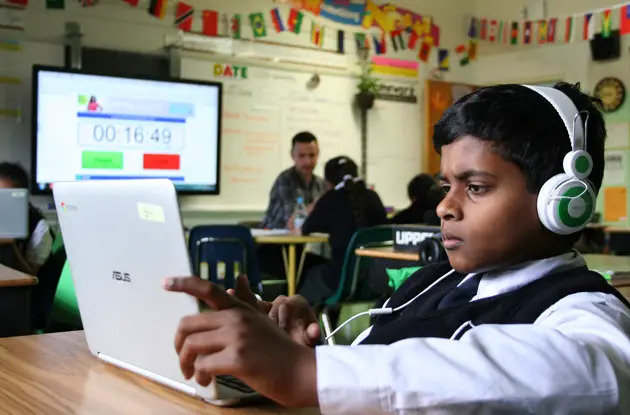Responding to alarming new research that shows more than one-third of children are developmentally unprepared to enter kindergarten because of limited exposure to language in the home, the American Academy of Pediatrics (AAP) recently endorsed a new language development program called Bright Beginnings, for children under 3 years old. The Language Power program of Bright Beginnings aims to help parents give their children a developmental “head start” during those first few years — when children grow and develop more dramatically than at any other time in their lives. Solid research shows that the amount of interactive talking and encouragement children experience during their first three years could make a meaningful difference in their future development and academic success — a tenet upon which Bright Beginnings is based. The program’s materials — including a guidebook for parents, an instructional video, and a book for children called My First Picture Book — were dispersed to pediatricians nationwide last fall. The program’s sponsor, MedImmune, Inc., partnered with pediatricians after determining the important role physicians play in influencing early language development during their frequent interaction with children and families. The Language Power guidebook gives families exercises, examples and games to encourage and increase verbal interaction; while the children’s book has 100 pictures with names, using the most common words spoken by 11- to 24-month-olds. The non-profit program was originally initiated six years ago for a community-based organization called Colorado Bright Beginnings (CBB). Since 2000, the program has gained wide acceptance with Colorado parents, and its success has led to the AAP’s support, through an unrestricted educational grant from MedImmune. “Studies showed that many families provided a reasonable amount of stimulation to their babies. But we saw a divergence in development from age 12 to 24 months,” says Steve Berman, M.D., president of Bright Beginnings, a past president of AAP, and professor of pediatrics at the University of Colorado School of Medicine at the Children’s Hospital in Denver. “In that time, certain families seem to lack the resources or knowledge to know the kinds of experiences that children need, language- and vocabulary-wise.” This is unfortunate, Dr. Berman says, because language and vocabulary at age 2 and 3 is highly predictive of school readiness and academic achievement. Such achievement is also related the number of words that children are hearing, and the ratio of encouraging words, (such as “terrific”, “great job” or “you did it!”) to discouraging words (like “no!” or “stupid”). “Language Power can be an extremely helpful tool for parents, most of whom already know they need to talk, play and encourage their child to promote language development,” Dr. Berman says. “But many do not know how much they need to do this.” Giving parents these tools can be very powerful, he adds. “The message is pretty clear. Parents need to understand the power of talking with, and encouraging, their children during the first years of their life, and especially during the first 12-24 months.” Start talking to your child as early as possible, says Rica Vizarra-Villongco, M.D., a developmental pediatrician at New York Presbyterian-Weill Cornell Medical Center. “Hearing develops before birth, so from the moment they are born, start talking,” she urges, adding, “the more you talk to them, the more you see a response.” It’s better than television, Dr. Vizarra-Villongco says. ”Talk your way through activities. Reading is a big thing, too,” she says. Dr. Vizarra-Villongco urges parents to have their children finish the ends of sentences in books. “Talk, read and interact so you can pick up problems early and be able to address them at critical points,” she says. “If you notice any problems, you can intervene and eliminate a lot of frustration that occurs when a child can’t communicate.”
Is your youngster up to speed? By age 1, children should start pointing and should be saying their first word other than “mom” and “dad”, Dr. Vizarra-Villongco says. By age 2, she says, they should be able to have two-word conversations, with a vocabulary of a minimum of 50 words. “If a 2-year-old comes to the clinic and only says five words, that needs evaluation,” she says. A 3-year-old should speak clearly and use three-word phrases, and a four-year-old should be 100 percent clear, she says. If there is a problem, many programs, including federally-funded ones, are available to help children speak and communicate clearly. Talk to your pediatrician who can point you in the right direction, Dr. Vizarra-Villongco says. Joslin Zeplin, a Manhattan-based speech and language pathologist, offers this advice: “Set up situations where you can talk with and read to your children. Make language simple and speak at a rate that is easy for your children, and set up situations where the child gets to use language rather than anticipating their needs.”
Stuttering: a calm approach is needed
More than 90 percent of parents may be tempted to urge a stuttering child to slow down and relax, a strategy that can compound the problem, according to a recent national survey conducted by The Stuttering Foundation, a non-profit organization dedicated to the prevention and treatment of stuttering And as New York City speech therapist Joslin Zeplin puts it: “That’s exactly what not to do.” In the poll of 1,000 parents, fully one-third of those surveyed said they would correct a child who stuttered or finish their sentences. Yet such simplistic advise won’t help stop this complex disorder, Zeplin says. “This may aggravate the problem, so the best thing to do is remain calm, listen carefully and allow your child to finish his or her sentence without interruption,” she says. “Parents should talk in a slow, relaxed way. This will be more effective than any criticism or advice to ‘take it slow’. Tell the child that you are listening to what they are saying, not how they say it.” On a positive note, 84 percent of those parents surveyed said they would seek professional help if their child developed a stuttering problem. About 3 million Americans are afflicted with the complex disorder. “If stuttering occurs when your child is learning language, it may not be abnormal. But if it persists, talk to your doctor about seeing a speech therapist,” Zeplin advises. If stuttering lasts longer than six months or if it seems severe or worsens, an evaluation by a speech therapist is recommended. The good news is that the success rate is very high when children begin therapy between the ages of 2 and 5. “With early detection and intervention, stuttering in young children can almost always be overcome. It is crucial that parents be informed,” says Jane Fraser, president of The Stuttering Foundation. For more information, visit The Stuttering Foundation at www.stutteringhelp.org or call (800) 992-9392, or (800) 967-7700. The Foundation lists speech therapists, intensive clinics, and summer clinics by state and country.




















